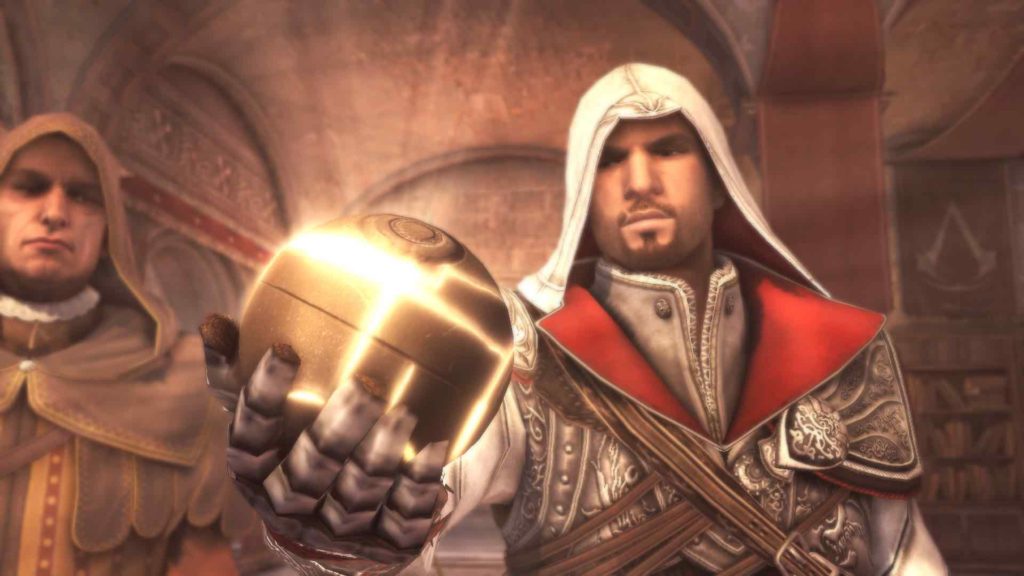
Ah, the Pieces of Eden. The eternal MacGuffin of the Assassin’s Creed series. These ancient artifacts were crafted by the Isu, the race of triple helix DNA beings that ruled the Earth thousands of years ago and created Homosapiens to be their slaves. Many players and even fans of the Assassin’s Creed franchise write off the convoluted lore as not worth the time to understand or disinteresting compared to the historical fiction. I, however, believe the Pieces of Eden, and the larger lore beneath the franchise, are some of the most interesting parts.
The Pieces of Eden were created for essentially one of a few reasons: to control humans, to fight other Isu, or to communicate with future beaters of these artifacts in order to control the fate of the world. There is a boatload of lore behind the Isu, their devotees, their descendants, and how their wars have evolved into the conflict between Assassins and Templars we all know and love. The short version though, is that the Isu are all the gods of ancient mythology you’ve ever learned about, and their relationships with each other and humanity are as complicated as ever.
Ultimately, the Pieces of Eden are absolutely terrifying tools of control and brutality and in the wrong hands over human history have and will continue to sway wars and worse. I have devised a list ranking each type of Piece of Eden found throughout the Assassin’s Creed games from least to greatest tool of abject oppression. Because even if Pieces of Eden aren’t real, their real-life analogs most certainly impact humanity’s fate all the same.
6. Rings of Eden
There has been only one Ring of Eden identified to date, having been at one point in the possession of privateer William Kidd and later Assassin Ratonhnhaké:ton (aka Connor) in Assassin’s Creed III. The ring isn’t too scary because its abilities are limited. It can cast a shield around its wearer, but it’s neither invincible nor omnipotent. Helpful in a pinch, but you can’t enslave humanity with this little buddy.
5. Shrouds of Eden
These Pieces of Eden are among the least terrifying as well. You spend some time chasing after one as Evie and Jacob Frye in Assassin’s Creed: Syndicate. They typically grant full invulnerability to their wearers, but throughout history, they seem to largely only wind up in the hands of nice fellows, like Joseph’s Technicolored Dreamcoat, Jason the Argonaut’s Golden Fleece, and Jesus’s shawl. Even if one should fall into the wrong hands, it’s only effective while you’re wearing it, making it easier to foil an evil plot handed around one than the remaining Pieces of Eden.
4. Swords of Eden
Many different Swords of Eden have appeared throughout history. The most gruesome example wasn Atilla the Hun’s reign of terror as he conquered most of the continent with one in hand. Assassin Arno Dorian came across one of these in Assassin’s Creed: Unity. They grant their wielders charisma and leadership as well as some very Link with full hearts-type projectile powers. I’m going to count the Spear of Leonidas among these types of Pieces of Eden as well, the main weapon of your character in Assassin’s Creed: Odyssey. They are powerful as weapons on their own and can rally people behind terrible causes. But ultimately, as both of the Swords of Eden mentioned prove, they’re vulnerable to being broken or disarmed.
3. Staves of Eden
These Pieces of Eden vary pretty widely in their utility, from the Papal Staff of Assassin’s Creed: Brotherhood to the Staff of Hermes Trismegistus in AC: Odyssey. But their greatest shared terror is that they act as keys to Isu vaults and other dangerous places. Locked away in these Isu temples may be other Pieces of Eden, entire sunken lost cities, or the personalities of an Isu themself who will try at all costs to influence its wielded. Unlocking the world of the Isu and their world-ending wars? No thanks. Not to mention the Staff of Hermes also grants its weirder immortality. Not great.
2. Crystal Balls/Skulls, Koh-i-Noor, Isu Manuscripts, Precursor Boxes, Pyramid, etc.
These Pieces of Eden are lumped together because they offer similar functions: access to knowledge. They started to appear in games like Assassin’s Creed IV: Black Flag, Assassin’s Creed: Rogue, and Assassin’s Creed: Chronicles (these are amazing games, do not dare sleep on them). Whether they were made to reveal the location of other pieces, secret knowledge about the end of the world, the consciousness of dastardly Isu, or visions of the past and future, knowledge is always power. The Assassins and Templars have fought for millennia over access to Isu knowledge. The very core of their creeds is based on who should have the knowledge and who should be able to weird it. The Assassins believe in free will and the right for everyone to have equal access to knowledge with which to make their own decisions. The Templars believe that only a concentrated few should have all of the knowledge so they can lead humanity toward objectively right decisions. Both views are flawed, but ultimately, either creed’s quest to control access to knowledge is terrifying because no matter who wins, somebody still holds the keys. Knowledge will never truly be free.
1. Apples of Eden
These are the true menaces. The big, surprise finale of the original Assassin’s Creed showed these monsters in all of their glory. Isu created the Apples of Eden for the singular purpose of controlling humanity like livestock. It worked until Isu and humans interbred, some humans gained triple-helix DNA like the Isu and became immune to the apples’ control. Still now though, these devices can completely bend any non-enhanced human to its whim. And when combined with any other Piece of Eden, especially a Stave that amplifies its power, an Apple of Eden could be the swift downfall of society.
No, the Isu and their many Pieces of Eden are not real. But the powers they can hold over ordinary people in the hands of the wrong leaders are no different than the ways unjust leaders in the real world wield weapons, politics, and media against humanity. Be wary of the Pieces of Eden as they appear in real life. We may not have Assassins working in the shadows to keep them out of the hands of today’s Templars.
Assassin’s Creed Valhalla is available on November 10, 2020.







